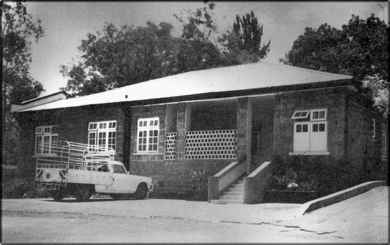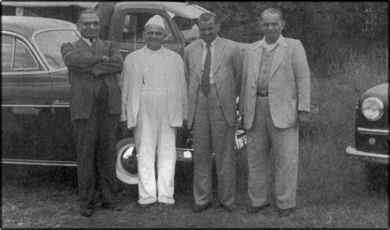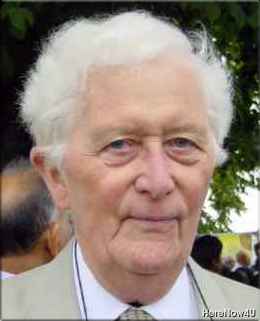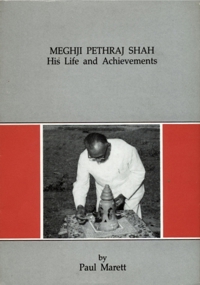
During this period the family grew. Four daughters were born in a period of six years. Meenal, Maniben's eldest daughter was born in 1934. Two years later Jaya was born and she was followed in 1937 by Sumi. Their youngest daughter, Nalini, who is nicknamed Usha, arrived in the family in 1939. After the birth of four daughters the parents were further blessed with two sons and with them the family was complete. Vipin, the eIder son, was born on Friday 12th November 1943 and Anant, his younger brother, on Friday 4th June 1948. It seemed that, after the earlier troubled years, God was compensating Meghjibhai for his former sorrows.
When Vipin was born in 1943 the overjoyed father telephoned Mr. Gathani to tell him the good news. His baby son, he said, was a gift of the gods in reward for his work for the Bengal Famine fund. Perhaps Mr. Gathani's reply planted a seed in Meghjibhai's heart. He said that God has given you a son as a reward for collecting other people' s money: how much greater a reward will you receive if you do good with your own money? Do not, he added, give to the gods or temples, they are well provided in India already, give to education, that is the best cause. There is a story of the boy who was hungry and asked a fisherman for a fish. The fisherman said 'If I give you a fish you will be hungry again tomorrow so what I will do is teach you to fish'.
This was a period when Meghjibhai's business and prosperity were expanding rapidly. Not infrequently, people find that devotion to business means that family life suffers. He was careful not to fall into that trap. When he was at home he put business cares aside and devoted his whole attention to his wife and children. He was very concerned about the upbringing and education of his children. Brought up in a poor family himself, he was not able to have much education. Now that his children were growing up in a rich family he insisted that they did not neglect their studies on that account. The family moved to a new house, comfortable and attractive but quite modest, in the grounds of the Thika factory when Meghjibhai assumed full control of the tannin extract business in 1943. They lived there until Meghjibhai's retirement and in 1953 he built a substantial (but not ostentatious) house standing in a moderate-sized garden on Limuru Road, in one of the best suburbs of Nairobi. This remained their Kenya home until Meghjibhai finally divested himself of all business interests in Kenya and moved to India.

Meghjibhai's home in Thika.
Family life was important to Meghjibhai. Devoted to his parents while they lived, he showed the same devotion to his children. He showed no favouritism to any one of them. He believed strongly that daughters should get as much education as sons. Sushila, the eldest, received her education in Africa where she stayed at school up to the seventh class. Meenal went to New York to do her B.A. Jaya and Sumi graduated in Bombay, the former as Bachelor of Arts and the later as Bachelor of Science. Nalini received art training in London. The girls all appreciated the value of education: their parents gave them free choice in the matter of their own education and brought no pressure to bear upon them. Both of Meghjibhai' s sons studied in London. Vipin, the elder, studied law and qualified as a barrister, whilst Anant took the degree of B.Sc. (Economics) at London University. Both the brothers are currently engaged in business.
Meghjibhai had the happiness of seeing all his five daughters married in his lifetime. All of them are now living in London. There are many grandchildren. Sushila has two daughters and three sons, Meenal has a son and a daughter, Jaya has four daughters, Sumi has two daughters and Nalini has two sons. Vipin has one son and one daughter, Binoy and Vaishali, and Anant also has a son and a daughter, Anish and Meghna. After his father died in 1934 Meghjibhai brought his mother to live in Nairobi. Although he had been unable to look after his father in the last days it was a great comfort to be able to care for his mother in her old age. She died in 1951. Meghjibhai accepted sadly but calmly the loss of one whose life had been bound up with his for nearly half a century. Now that both his parents had passed away, Meghjibhai was prepared to pass on the reins of business to others and devote himself to a life imbued with the spirit of service.
The success of the Thika enterprise raised Meghjibhai into the first level of the Asian businessmen in East Africa. He was now a very wealthy man. The late nineteen-thirties and the nineteen forties saw further expansion of his business empire. Mention has already been made of the cotton ginneries at Sagana and Meru and the petroleum import business. The company of Premchand Raichand became the second biggest undertaking in the Kenyan produce business (second only to Kenya Fibres Association, a European settlers' enterprise).

Meghjibhai, Premchandbhai, Hemrajbhai and Juthalalbhai
In 1943 the longstanding partnership with Premchandbhai Vrajlal Shah, which had been formed fourteen years earlier, came to an end. Premchandbhai had returned to India in 1941 and the dissolution of the partnership took place in a most amicable fashion. There is no doubt that Premchandbhai had contributed a great deal to the success of their joint business ventures: like Meghjibhai he was a man of foresight and considerable business ability and the two men made a formidable business partnership. However, now that he was on his own, Meghjibhai's business interests continued to expand. C. U. Shah - Chimanbhai - knew Meghjibhai well during this period; in fact, in spite of a considerable difference in their ages they were close friends as well as business associates. Chimanbhai well remembers their first meeting when Meghjibhai was in India for the marriage of his eldest daughter Sushila and Chimanbhai was awaiting the results of his law degree examinations. They met at dinner at the house of Dr. M. T. Shah, a good friend of Meghjibhai. This was in December 1941. When Chimanbhai, in reply to a question, said that he was intending to go into his father' s business, Meghjibhai suggested that he would do well in East Africa where people of education were in short supply. They sailed together to Mombasa on the 3rd of January 1942. One early result of their association was the firm of Raichand Brothers (India) Pvt. Limited, formed on the 21st of July 1944, the shares being held by Meghjibhai and his brothers and C. u. Shah. The company pioneered the import of East African wattle extract and took eighty to ninety per cent of the market.
When the partnership with Premchandbhai was dissolved, Meghjibhai chose the Kenya Tanning Extract Co. Ltd. as the major part of his share of the assets. It was a wise choice for the company, as we have seen above, continued to flourish in spite of temporary setbacks. A totally different venture was Colonial Merchants Ltd., a company formed by Meghjibhai in Nairobi in 1949 and engaged in textile imports, mainly from the United Kingdom, India and Japan. In 1949 he had the opportunity to buy nearly sixteen thousand acres of sisal land near the town of Lindi in Tanganyika from Mathuradas Kalidas. It was a major business risk, but, as with so many of his enterprises, his foresight, combined with hard work, paid off. A large part was sown and three factories were established on the remaining land. Two thousand five hundred workers were employed and the output of the factories was four thousand tons of sisal fibres a year. He was fortunate (or foresighted) that he was holding substantial stocks when the price of sisal reached a very high point. One stroke of luck, which he could not have foreseen, was the devaluation of sterling at that time which gave him an unexpected bonus of ten per cent of the value of his sisal. All this involved much of Meghjibhai's time, leaving him little time to devote to his other enterprises. He received a good offer for the land and business so he harvested the crop while prices were high and then sold out to Lalji Makhanji of Nairobi before 1952.
From the time of his first arrival in Kenya, Meghjibhai had been involved (at first in a lowly position) in the financial aspects of business. During his business career he was involved in a small way in holding deposits for other businessmen but this was by no means banking, rather a service to his friends and associates. In 1952, however, he did move into the finance business with the formation of Guarantee Discount Company Limited. It was a high-risk business and he had to charge accordingly. Inevitably he suffered from some defaulters, sometimes he made losses but he made a point of not pursuing his debtors into the courts but rather wrote off the bad debts. The provision of venture capital and hire purchase finance was an important service to local entrepreneurs: Meghjibhai was a good judge of people and of business prospects and in spite of some defaults the Guarantee Discount Company was successful. When he gave up his interests in Kenya in 1958 he sold the company to a group consisting of his brothers-in-law, H. N. Shah and K. N. Shah, and M. I. Patel. In 1953 C. P. Shah, whose reminiscences of Meghjibhai will be mentioned later, came to East Africa with the responsibility of opening branches of the Bank of Baroda. Meghjibhai had a number of schemes in mind for the development of banking and contacts between the two became close. Later Meghjibhai also met two directors of the Bank of Baroda when they visited East Africa, Shri Naval Tata and His Highness the Maharaja of Baroda, Fatehsinharao Gaekwad, and his suggestions and active co-operation were found valuable in developing branches of the Bank of Baroda. He continued to give invaluable service to the Bank until he left Kenya. The establishment of a banking business in the British Isles was a longstanding ambition of Meghjibhai but it was not achieved in his lifetime.
 Dr. Paul Marett
Dr. Paul Marett

